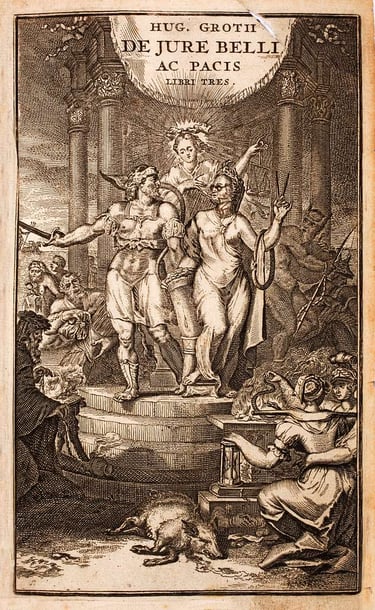Hugo Grotius’s On the law of War and Peace
Hugo Grotius's "On the Law of War and Peace" (1625) is a monumental legal work that sought to establish a rational framework for international relations amidst widespread conflict. Grotius argued for universal principles derived from natural law and the law of nations, meticulously outlining criteria for just war and humane conduct in hostilities. This treatise's immense significance lies in systematically articulating international law as a distinct, secular body of rules, providing a cornerstone for the discipline. Its profound legacy directly influenced subsequent international treaties and organizations, with concepts like just war, treatment of prisoners, and state responsibility tracing back to Grotius's pioneering efforts, making it indispensable for understanding the modern global legal order.
Published in 1625 during the brutal Thirty Years' War, "On the Law of War and Peace" (De Jure Belli ac Pacis) by Hugo Grotius stands as a monumental work in legal thought. Amidst a period of widespread religious conflict and political fragmentation, Grotius sought to establish a comprehensive framework for the conduct of states, both in times of conflict and peace. He argued that a universal set of principles, derived from both natural law (rooted in human reason) and the voluntary consent of nations (the law of nations), should govern international relations. The treatise meticulously delved into various aspects of warfare, outlining criteria for just recourse to war (jus ad bellum) and humanitarian rules for conduct during hostilities (jus in bello), thereby seeking to introduce order and morality into a seemingly lawless international arena.
The significance of this seminal work is immense, as it systematically articulated the concept of international law as a distinct body of rules, independent of theological dogma or imperial decree. It provided a rational and secular basis for governing interactions between sovereign states, fostering the idea that nations, much like individuals, are subject to legal obligations. This intellectual leap laid the very cornerstone for the discipline of international law. Its legacy for modern law is profound, as its principles directly influenced subsequent international treaties, conventions, and the establishment of international organizations. Concepts such as the justification for war, the treatment of prisoners, the protection of civilians, and the notion of state responsibility can trace their lineage back to Grotius's pioneering efforts, making his work indispensable to understanding the contemporary global legal order and the ongoing pursuit of peace and justice between nations.


